Five Records: Objekt
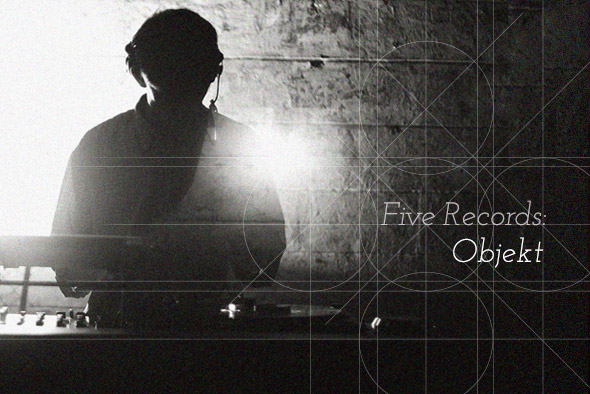
The man known as Objekt invites Brendan Arnott into his Berlin studio to talk about five records that have shaped his tastes, taking in Paul Simon, Tears For Fears, Loefah, Autechre and British Murder Boys.
It’s tough to get lost in Berlin. Public transportation is so intuitively organized that several times throughout my two week stay, I’ve felt like I’m floating in the right direction without even really being conscious of it. At around 7pm on my last night in the city, still reeling in my very first post-Berghain haze, I manage to hop on the right trains and buses that take me to TJ Hertz’s apartment. We retreat to his personal studio where a gigantic mixing board sits alongside several synths and other assorted equipment.
He’s inherited a fair amount of it from his mother, a former composer who still dabbles despite switching fields to psychotherapy. “She’s the only person I know whose parents pressured her into music only to decide she wanted to do something else instead” Hertz laughs. In between discussing a recent fundraiser for Syrian refugees that he played at the night before and revealing a few secrets of the home studio, such as how parts of “CLK Recovery” were made – by slamming a filing cabinet open and shut and sampling it – Hertz opened up about five formative records in his life.
We kept the criteria for choosing these records pretty purposefully vague, so I’m interested if there was a process you used to narrow down your choices?
Not really, no. I guess the order was maybe roughly chronological, in terms of when those records had an impact on me. It was pretty open.
Would you call your choices from this list more analytical or emotionally based?
They’re definitely both. I thought it would be a bit sad to pick five tracks where I just admired the production so much that I just had to explain to everyone why the snare sounded so good or whatever, but I think in the end there’s definitely an element of that to my selections as well. The importance of production value is inherent to a lot of the tracks that I like – clearly Autechre wouldn’t sound the same if the sonic palette were completely different or if it were played by a band.
1. Tears for Fears – “Mothers Talk” (Phonogram/Mercury)
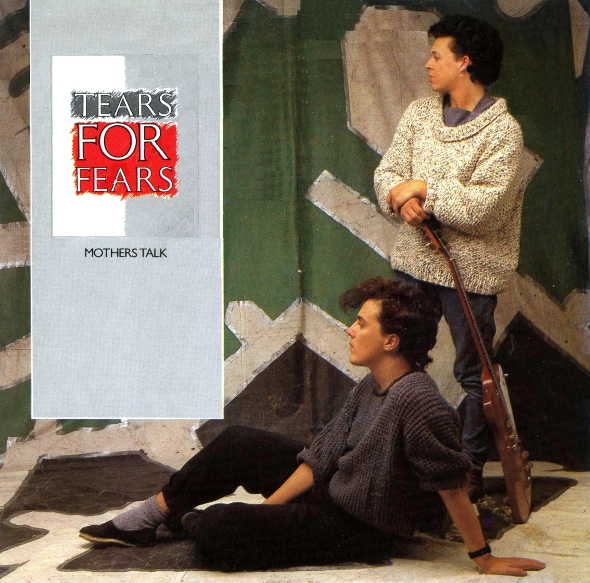
What’s your first memory of hearing this song?
It must have been in my Dad’s record collection I guess. I was listening to records like this one, Steely Dan and Toto when I was about six to eight years old. I think it’s fair to say that my parents both have fairly “safe” tastes in music in terms of where the music that they enjoy fits into the progression of whatever genre it’s in. So, in the earlier stages of my life, when I was still very focused on being a musician – I played a lot of drums until I was about eighteen – I guess the influence that I took from the music that they were listening to was largely concerning the musicianship, and learning the rules, rather than learning about rebellion or learning about innovation.
Before you learn how to be weird and subvert a genre, you need to learn the staples of it.
Sure – and I mean there’s not a whole lot of stuff that I was listening to as a kid that I go back to now, but this is one record that still means quite a lot to me, even though I never actually owned the album, I just had like the greatest hits CD or something, and I must’ve listened to that through hundreds and hundreds of times. As a young kid, who’s musical in some way, just like learning a language, you pick up a lot of things from music subconsciously that you listen to at that age that you can’t really explain and that impacts you more than stuff that you listen to later on. And I think that probably something about the harmonies, the harmonic structures, the chord progressions and melodies from things that I was listening to when I was 7-13 stuck with me in a way that they wouldn’t have had I heard them ten years later.
Just like when you’re young, you can pick up languages almost intrinsically.
Exactly, and the fact that the production on this record is so clean and so exact was probably something that just formed some kind of mould very early on, and maybe subconsciously instilled this desire to make music where everything fits into place like a jigsaw.
I notice this and your next selection are both arguably “pop hits” – I’m curious about what your relationship with pop music is like in 2014? I don’t hear a ton of pop in Objekt productions…
Well, I mean, I don’t really have a relationship with the pop mainstream at the moment. I don’t know what’s in the charts – the kind of stuff that I hear on the radio at the moment, it doesn’t really interest me. So, in terms of pop culture, I keep a safe distance. But, there’s still a pop sensibility to what I do, even if it’s very obscured. There’s a crossover between pop songwriting and song structure for electronic pieces. It doesn’t have to be like, verse-chorus-bridge-chorus, whatever, but just that fact that one pays attention to how pieces can be structured in a way that makes sense.
Buildup and release are both very important to those genres in different ways.
And the fact that my music isn’t just about the loop, even though repetition is important to the stuff that I do – I think that the pop influence comes in the sense that I don’t just play around with bringing elements in and out like in more straightforward tool techno. I’ve borrowed a fair few devices from pop composition. Certain kinds of call and response phrases, certain harmonies, certain things that pop might use as backing vocal techniques – I guess I’ve probably subconsciously internalised it one way or another.
And not just pop – I spent quite a bit of time in my teens playing drums in big bands and small jazz ensembles. Big band jazz is certainly not a genre of music that I listen to now, and it’s not something that’s now particularly close to my heart (laughs). But I dunno, the intro to “CLK Recovery” – if you ignore the fact that it’s played by a synth – the intro is basically a horn part. I don’t think I consciously wrote it that way, but I listen back to it a few months later and thought – this is a big band arrangement sequenced on a squelchy polysynth. The notes, the articulation, it’s all there. So for sure, those years rehearsing with a pretty cheesy big band had their influence in some way. But I’m mindful of letting those influences creep out in ways that don’t just appear tokenistic, like… sampling a trumpet over a house track, or whatever.
2. Paul Simon – “50 Ways to Leave Your Lover” (Columbia)
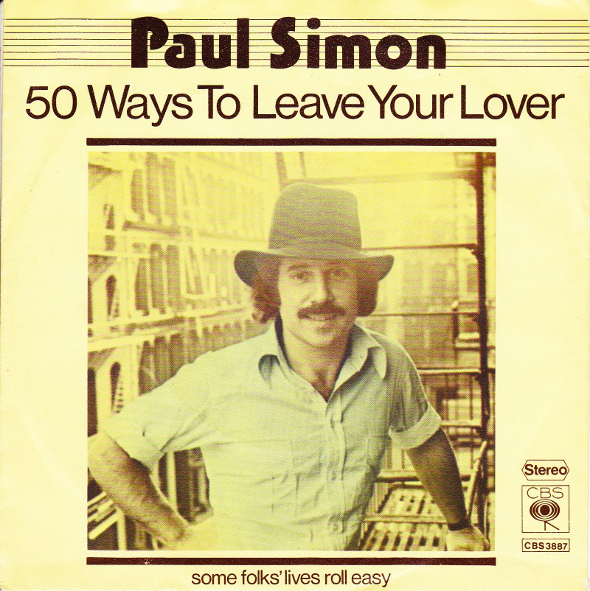
So your next choice is this Paul Simon track – you chose “50 Ways to Leave Your Lover”, but also mentioned that anything by Steve Gadd could go on this list.
Yeah, this track is all about the drums. And playing drums was a really important part of my life for probably eight years or so, even if a lot of the music that was most influential to me at the time isn’t necessarily music that I’d go back to and listen to now. A lot of it is pretty tacky session musician stuff that is only really interesting to people who want to develop their chops to the maximum possible extent. But Gadd is very much a drumming legend, and his style of playing is one that I still kinda feel the influence of now, because it’s very tight, very stripped back, he doesn’t play any more notes than he needs to – it feels like every fill, every extra hit is so carefully calculated that every stroke counts.
Apparently Gadd made an instructional video where he deconstructs the drums in “50 Ways”.
I think I used to have that video actually. I remember this great solo of his that he used to do variations on, called “Crazy Army”… I spent a lot of time when I was 13 or 14 going on Soulseek or Napster and downloading all these ridiculous drum solos. Obviously a lot of them were total wankfests but this one always stood out to me not because it was some metal drummer playing a thousand beats per minute on double kick drums, but it was Gadd just playing rudiments – just like a marching beat, a kick, and a snare and a high hat – and the meter and the timing and the groove of it was completely captivating. He has a really unique sense of groove.
When you would be watching these videos at a younger age, what would you try to pick up from them?
Well with Gadd it would have been the meticulous precision of the strokes and fills. But at a younger age, you don’t have the benefit of maturity to realise what it is that makes his playing so effective – it’s not the notes themselves but the space in between them. Which, when you’re 14, of course, is less interesting than the notes that he does play. But it’s tremendously difficult to play such restrained patterns with so much conviction. It looks really easy, but to leave that amount of space and still not only keep the time, but have such a propulsive feeling, is really difficult. It’s a lot easier to just work up the chops to be able to play really fast.
3. Autechre – “Dael” (Warp)

Alright, let’s move on to Autechre’s “Dael” – a track that I’m never sure quite how to pronounce.
I never really knew how to pronounce it either.
It’s another track that’s really propulsive. What sort of memories does this record brings up for you?
Certainly not clubbing. I didn’t get into dance music until about maybe 19 or so, and I first heard this track when I was about 14 or 15. I think at the time I was probably listening to Radiohead and not a lot else, and I think my route into IDM was mostly through them and the fairly obvious stuff at the time, Aphex Twin and Autechre and Boards of Canada. But the only electronic music that I’d heard at the time was radio friendly pop dance, whereas this track just sounded completely alien to me.
It starts off sounding really industrial and metallic, but throughout there’s a winding rhythm that develops – is that an important kind of interplay for you in your own work?
That’s not something that I was really going for at all until much more recently – well, maybe it’s something that I only put my finger on more recently. I’m really into this juxtaposition of total, brutal austerity in the percussion and sound design, and melodies that are luscious but very understated… almost kind of naive… which I guess comes from more Aphex Twin than Autechre. But at the time, what attracted me to this track and to the rest of Tri Repetae was the drums and the starkness of it.
Did you find something in Autechre that wasn’t in other IDM stuff?
I think there’s a real sexiness in how cold it is. I thought that was so fucking cool at the time. I mean, I still do. But it’s not like I got into Autechre and then dove straight into IDM and emerged at the other end with techno. I was dipping into all of these things, and I was mostly still into guitar music at this point. I guess I included this particular track because it’s sort of where I ended up at the end of all of it, and I guess I’ve come full circle – what I’m interested in now is this sort of crossover between techno and IDM and electro and noise, which is kind of where it all started for me, even if I didn’t exactly jump straight into the rabbit hole from here.
4. Substance & Vainqueur – “Emerge (British Murder Boys Remix)” (Scion Versions)
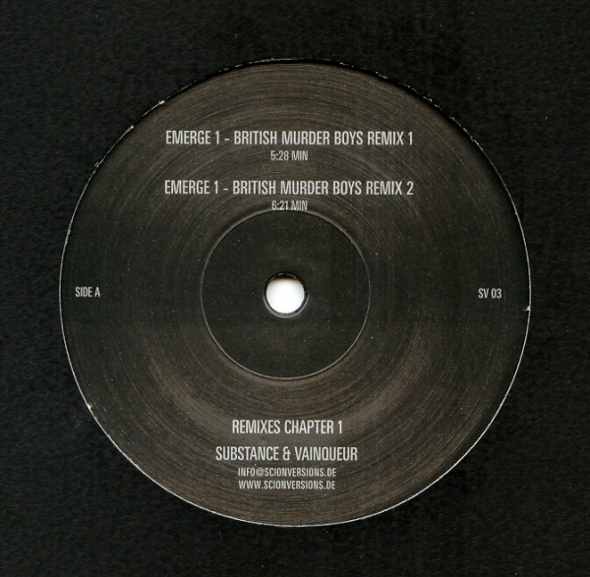
Did you come to this remix through the original track?
No, I think I heard the remix first. Actually I chose this track because it’s a nice intersection between quite a few influences for me, and I was struggling a bit because, with five tracks to pick, and two of them being completely unrelated to techno, I was still left with three that should in some way, cover the range of the kind of electronic music I’m listening to…
Which may be an impossible task, to be fair.
Well, the thing is that a lot of what I was listening to around when I started getting into dance music is stuff that I find pretty awful now. I don’t have an “Energy Flash” or a “Voodoo Ray” that I can say really changed my life forever in a field just outside the M25 aged 16 – I’m a bit too young for that at 26. So although I’ve done my digging, a lot of the really seminal releases weren’t as influential to me as certain marks on my own personal timeline.
But I thought this track nicely straddled three different things for me, one of which is Basic Channel, dub techno, Chain Reaction and so on, which I spent a lot of time listening to early on. Second is Surgeon and British Murder Boys, which was and still is a really strong reference point for me, especially since Surgeon’s “This Is For You Shits” mix, which was one of the first things that got me into proper techno around 2007. And the third is the fact that it’s got a broken beat and is rhythmically and sonically tied in to IDM for me. It nicely bridged the reference points that I’d had many years before when I was already listening to a little bit of that stuff.
Why is the broken beat important to you?
I feel like there can be a lot of room for groove when you’re not restricted to this 4/4 pulse. And obviously I started out as a drummer, so that’s a kind of interesting area for me to explore. It moves me in a certain way, that’s it (laughs).
This is the only remix on the list that you’ve given – in your own productions, you’ve done remixes for other artists, but you’ve never been remixed. Is that something that’s just never taken shape, or something that you’ve purposefully held off on?
I wouldn’t rule it out, but I haven’t looked that much into it. I also don’t really feel like I’ve released quite enough music to start looking at things like remix EPs… it would feel too much like milking my existing material for all it’s worth.
5. Loefah – “The Goat Stare” (DMZ)
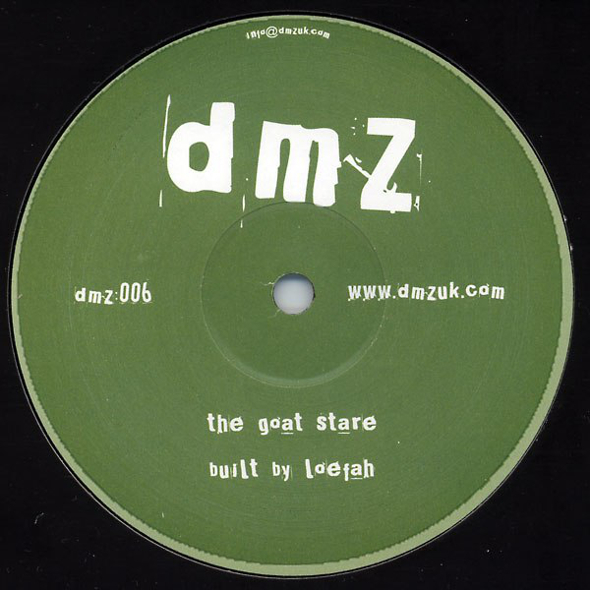
Let’s talk about “Goat Stare”. I’m curious if this is ever a song that you’ve listened to in a club.
Only once or twice. I didn’t hear it in a club at first.
I ask because I was listening to it on my tinny laptop speakers at home, I haven’t heard it in a club either. But reading up on it, a lot of people have talked about hearing the sub-bass when it really kicks in, and how it causes this physical, stomach rumbling, floor-shaking, reverberation that might be completely absent outside of a large sound system.
The sub bass is part of it, but for me the main thing is again, this coldness, the mechanical austerity of it, which is something that I hadn’t really heard in dubstep until I heard this. I was quite a way behind the curve at the time, and I wasn’t really a “dubstep head” per se – I was really in two minds about whether to include a dubstep track in this selection at all, because I feel like I spent two years trying to shake that particular tag since dubstep really isn’t where I’m coming from musically despite releasing one or two dubstep tracks in the past. But at the same time it would be disingenuous to claim that it hasn’t influenced me – it was definitely at one stage, maybe for a year or two, a considerable influence, especially with tracks like this.
I never went to DMZ or FWD, but I remember at one of the earlier Wax Treatments in Berlin, standing in front of this wall of soundsystem, with a whole room of people dancing facing that way, towards the stacks and away from the DJ, with all the lights off save for the strobe, with someone playing a bunch of these DMZ records – this was before I knew anything about dubstep, really – and what I took away from that experience was this really oppressive and yet still totally engaging vibe. It felt like a… almost like a march, but at the same time one that was really positive and inclusive. It was almost militaristic, but not in a… violent way, or in a fascist way. Just the kind of rhythmic aesthetic of it was very propulsive and stripped. I suppose in some really roundabout way, it relates back to the Gadd influence – maybe that’s a bit tenuous. I dunno.
So yeah, it’s got sub, but for me this track was always much more about the kind of push and pull between the kick and the snare, and the way it kind of grabs you and kicks you around, in this rigid yet fluid way.
The sample from Scanners definitely fits with that militaristic feel of rigidity and uniformity too.
Well, if I’m honest, the whole movie-sample side of dubstep is something that I’ve always found pretty tacky. The sample… it is what it is. That definitely wasn’t the first thing that I set out to try and imitate (laughs).
Were you living in Berlin around the time you were listening to this music?
Yeah, I guess I moved over here a year before, like 2009.
I think the DMZ movement has a very localised geographic location tied to it for some people, and after spending a bit of time here in Berlin, I think it often gets paired with a very localised sound. What do you think of the connection between musical movements and locations? How much does location shape the music that comes from it these days?
That’s an interesting one. I guess this is a point of view that’s been expressed many times before by people more articulate than me, but it feels like the opportunities for a localised micro scene to develop into something real and tangible are kind of drying up. Influences are spread far and wide long before that these days. Instead of a tray of water where you have different coloured blobs of oil forming interesting shapes, now some kind of thinner has been introduced and the colours just mix into each other immediately – as soon as some micro-genre hits the internet, people are imitating it everywhere.
I guess there are some things that are location specific – still now, the fact that certain kinds of 4/4 dance music are so entrenched in Berlin culture probably has something to do with the fact that the clubs are open very late and people party for a long time and there’s this kind of like – “c’mon, keep going, don’t let the kick drum stop” aspect to it. But even that’s changing, I mean, 4/4 is everywhere now, tech-house is everywhere. I dunno if I feel that qualified to answer that question, because I haven’t really been that involved in any localised musical movements – even dubstep, I experienced from a distance. Techno’s spread so far since the early ’90s that it kinda can’t be a local thing anymore.
In picking these five tracks, do you ever feel nostalgia for an age, time or production style? Or do you think that sentimentality doesn’t really serve much of a purpose anymore?
I think one can only really be nostalgic for times in one’s own life – otherwise it’s not really nostalgia. And I’m definitely nostalgic for times when I was younger and felt maybe much more of an emotional connection to the music that I was listening to – not that that’s completely absent from the music I’m listening to now, but you’re only sixteen once. And, y’know, there’s still songs I can go back to that make me feel the same way that they did then. I don’t know if I have that quite so much now, so I’m nostalgic for that. Actually one of my resolutions for 2014 is to listen to more music that’s in no way related to clubs or dance floors, because that’s something else that I’ve started to miss.
But nostalgia for a particular time in music? Not really, because I never experienced any of these movements first-hand. There’s a lot of great music being made now and I’m still discovering tons of great music that was made years ago. I think longing for some golden era of music that I wasn’t around for, that’s not nostalgia, that’s just retro fetishisation, and I think the great benefit of living in the present is that we can draw upon everything that came before without some dogmatic belief that things were better at some other time in the past.
Interview by Brendan Arnott
Header image by Ilaria Pace from a photograph by Brendan Goco
Objekt has remixed Jon Hopkins along with Karenn on the soon to be released Collider 12″ and also contributes to the forthcoming Vectors split release from Power Vacuum. He will also appear alongside Call Super at Dalston’s Dance Tunnel on Saturday April 19 – tickets for that here.